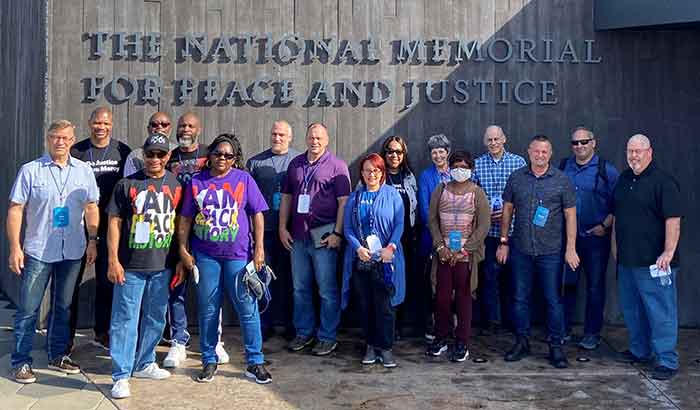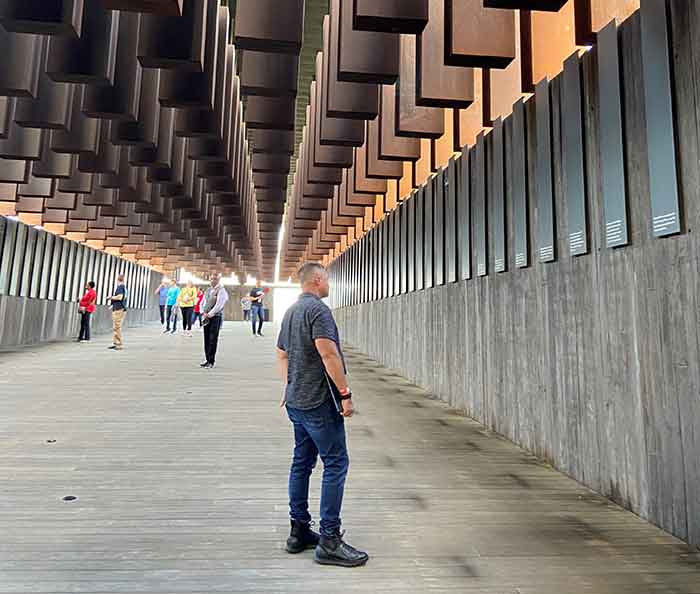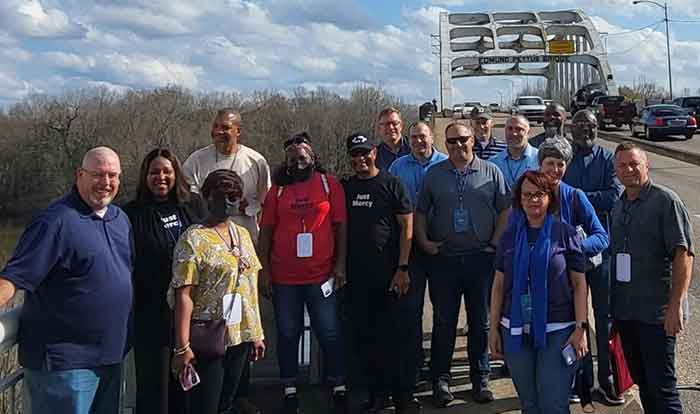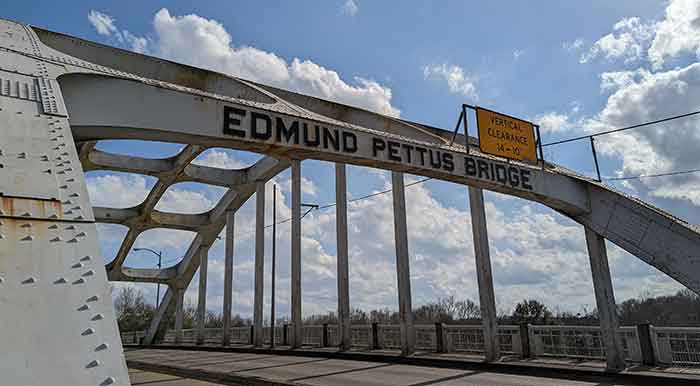Learn more and register for the next Cultural Immersion Trip
For a group of Converge representatives and ministry partners, a recent trip to Montgomery and Selma, Alabama, helped the individuals gain a deeper understanding of each other, a painful history for African Americans in the United States and the importance of biblical diversity.
The diverse group of 17 men and women met February 23-24 for Converge’s inaugural Biblical Diversity Cultural Immersion experience. The trip helps build bridges between people of varying ethnicities and encourages ongoing cultural relationships.
Gaining a better understanding of history rarely taught in schools
On the first day, they visited the Legacy Museum, which provides a comprehensive history of enslavement, reconstruction, segregation, racial terrorism and mass incarceration in the United States.
“The history of racial injustice in our country presented in the Legacy Museum drove home the reality that racism and inequality hasn’t improved as much as we’d like to think,” said Dan Dorsey, executive pastor at Calvary Church in State College, Pennsylvania. He is also a member of Converge MidAtlantic’s District Diversity Team. “Instead, it (racism) just changes shape and adapts, creating insidious new ways to perpetuate a system of racial hierarchy that’s very difficult to dislodge.”
Later that afternoon, they toured the National Memorial for Peace and Justice, the nation’s first memorial dedicated to the legacy of enslaved Black people, people terrorized by lynching, African Americans humiliated by racial segregation and Jim Crow and people of color burdened with contemporary presumptions of guilt and police violence.


The site is just a few blocks from the site of Rosa Parks’ 1955 arrest that led to the Montgomery Bus Boycott and helped catalyze the American civil rights movement.
Learn more and register for the next Cultural Immersion Trip
Experiencing history with those who lived it
The following day, Tabernacle Baptist Church of Selma hosted the group. Longtime church members shared about the 138-year history of the church, the city and their role in the U.S. civil rights movement. Tabernacle hosted Selma’s first mass meeting for voting rights in 1963.

One of the movement’s young foot soldiers of the early 1960s spoke to the group about his experiences participating in the many marches to protest the lack of equal human rights. He shared his recollection of Bloody Sunday, in which state troopers threw gas canisters into a crowd and assaulted protesters ― many of whom were high school and middle school students ― after they crossed the Edmund Pettus Bridge at the beginning of a planned march to Montgomery to protest the death of a young leader beaten by officers a few weeks before and to bring attention to a lack of voting rights for African Americans in Alabama and the deep South.
Later, a representative of Brown Chapel A.M.E. Church, another historic congregation that played a crucial role in the civil rights movement, shared the church’s history and her personal story of her involvement in the movement. The Bloody Sunday march, as well as another attempt to march two days later in what became known as “Turnaround Tuesday,” and the triumphant march to Montgomery later that month ― the latter two led by Dr. Martin Luther King, Jr. ― began at Brown Chapel.
After a short tour of Selma, the group visited Brown Chapel before walking across the same Edmund Pettus Bridge and standing in the exact location as the Bloody Sunday tragedy and the Turnaround Tuesday prayer.


Heaven will be a multicultural experience
Participants also held discussions about their impressions and experiences and how they could be applied in their lives moving forward. It was an eye-opening experience for most.
“Any time we can verbalize the things we’re experiencing and feeling as it relates to racial awareness, it really solidifies the whole experience and somehow makes it more real,” Dorsey said. “I was challenged by the humility and honesty in those conversations and feel inspired to continue that in my life and ministry setting.”
Converge chaplain endorser Carleton Birch was struck most by the stories he heard from the people who experienced the battle for equal human rights in the 1960s firsthand.
“Spending the morning with survivors in Selma, who were really among the first people on the front lines of the civil rights movement and hearing their personal stories from their childhood really impacted me,” Birch said. “They were kids who were leading these marches and protests.
“How that experience they had as children effected them through senior adulthood, and how they continue to want to make a difference today through nonviolence and the church was touching and affected me a lot.
“Cultural immersion always comes down to peoples’ individual stories,” Birch said. “Understanding people’s individual experience makes me appreciate what they’ve been through and how it shapes who they are. Most things don’t give room for that to happen, but this trip allowed for that. Conversations were deeper and much more meaningful than I would have otherwise been able to have with people.
Learn more and register for the next Cultural Immersion Trip
Dorsey said the experience helped him appreciate the opportunities ahead, both personally and as part of the greater church.
“Getting a taste of this initiative from the Biblical Diversity office made me more excited to be part of Converge MidAtlantic’s District Diversity Team,” he said. “I really value the racial diversity and unity that exists within Converge, but I know we can do better. For too long, the church has been complicit, sometimes overtly so, but more often through our silence. I long to see the day when Christians take the lead in combatting the sin of racism in ourselves, our churches and our communities.”
Birch said the experience served as another reminder that God’s ultimate plan brings us together into one family.
“When we get to heaven, it’s going to be a multiethnic, multicultural experience. So, it’s good to start training for that now.”
The Converge Cultural Immersion experience will be held annually and is open to anyone interested in participating (however, space is limited). For more information, contact the Converge Office of Biblical Diversity.
